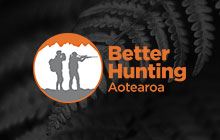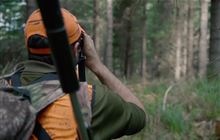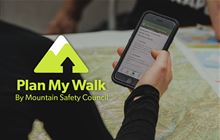Hunting safety
Introduction
Where to start if you've not hunted before, hunting guidelines, planning your trip, risk management, and advice on how to keep your catch safe for eating.On this page:
- Slow down your hunt
- Check where you're shooting
- Group hunting
- Gear
- Accidents happen more during the roar
- Firearm safety
- Hunting guidelines
- Be fire safe
- Clean up animal waste
- Keep your catch safe for eating
- Be careful around rivers
- Better hunting online education programme
- New hunters
Slow down your hunt
Most hunters that have killed someone thought they were shooting a deer and had identified all parts of it. Make sure this does not happen to you:
- Identify your target beyond all doubt.
- Make sure there’s no one in the firing zone.
- Take your time to identify your target.
- Slow down during your hunt to avoid slips, trips and falls.
- Think through how you hunt and if it could be safer.
It’s hard to change habits but if it saves someone’s life, it’s worth it. By following that guidance you will also improve your success rate when hunting.
You can also read the research and identify ways you can be safer while hunting.
Research showing factors that lead to accidents when hunting.
Always confirm your target
- Assume colour, shape, sound, and form to be human until proven otherwise.
- Movement, colour, sound and shape can deceive you.
More ways you can confirm your target.
Check where you’re shooting
Think through what you could hit in the area between you and your target, and in the area beyond your target. Make sure no one else or your hunting dogs are in your firing space. Keep them safe.
How to check your firing zone.
Hunting in groups
When hunting in groups, stop hunting if visual contact with a group member is lost, and do not resume hunting until visual contact is made.
How to hunt safely with others video and resources.
Gear
Wear clothing that contrasts with the surrounding environment so you don’t get shot.
A lot of animals only spot you from movement. For example, there is no evidence that deer can or cannot see any one colour better than another. Deer will spot a hunters movement rather than the colour of their clothing.
The roar is when most accidents happen
Because the roar is the most popular time for hunting. It’s also when there are more hunting accidents. ACC receives an increase in hunting related injury claims every year during the roar such as:
- slips
- trip
- falls, or
- firearm injuries.
Help lower the injury rate:
- Stay within your comfort zone.
- Be mindful of other people.
- Tell someone where you’re going before you leave home.
- Make sure you have the right gear and dress for the conditions.
- Store firearms safely when you’re near huts or campsites.
- Wear high-viz, especially if you’re carrying animals out.
Some hunters also use deer roar sounds to try and attract deers. Make sure to identify your target as it might be another hunter using deer roars.
What roar means
The roar or rut is when the stags are most vocal, calling to attract the attention of mates and to protect their territory. For red deer it’s from 20 March to 20 April, fallow and whitetail are later than this.
Firearm safety
If you're hunting with a firearm you must:
- hold a current New Zealand firearms licence
- follow every part of the Firearms Safety Code
- follow the seven safety rules.
You can learn from others by joining a club or taking a hunter safety course.
Get a New Zealand firearms licence
Hunting guidelines
- Follow the Firearms Safety Code.
- Always get a permit and abide by its conditions.
- Never spotlight on Public Conservation Land.
- Protect native plants and animals.
- Remove rubbish.
- Bury toilet waste.
- Keep streams and lakes clean.
- Consider others.
- Plan and prepare your hunt.
- Look after the facilities provided for you.
- Wear contrasting clothing.
Plan your trip, make it home
The terrain and conditions you'll encounter in New Zealand will vary widely depending on the season and location of your hunt. We encourage you to plan accordingly.
As a minimum, before embarking on your hunt you should:
- be familiar with the area or learn as much as you can about the area before venturing out
- leave your intentions with a trusted contact
- check the weather forecast for your region and altitude – if you're in alpine regions check the avalanche forecast
- follow the seven basic rules of firearm safety.
The Mountain Safety Council safety toolbox.
Be fire safe
Before you go hunting always check the local fire danger level and fire season status. Be extra careful during restricted and prohibited seasons.
- How to minimise the risk of unwanted fire when hunting.
- How to light fires safely on public conservation land.
Do not use high risk equipment
The following equipment is not allowed to be used on public conservation land due to the fire risk:
- bird scaring ammunition
- exploding targets
- tracer ammunition.
Other firearms are subject to hunting permit conditions, including black powder firearms which may be allowed with a special permit from DOC.
Clean up animal waste
When you're near tracks, campsites, huts and waterways:
- rubbish must be removed
- animal waste must be disposed of, and
- offal and carcasses must not be left behind.
Burying animal waste is the best method of disposal, so take a small shovel. Bury it well away from tracks, huts, campsites and waterways.
Keep your catch safe for eating
There are many different ways to keep your catch safe for eating. There are also many specialist game butchers in parts of New Zealand who can butcher your catch.
How to keep your catch safe for eating.
Be careful around rivers
Take care if you plan to cross an unbridged river or stream on your hunt, or if you plan to raft or kayak as part of your hunting trip.
Rivers are a serious hazard in the New Zealand outdoors and have claimed many lives.
Learn the warning signs of an unsafe river and learn about how to cross rivers safely on the Mountain Safety Council website.
If you are heading onto the river (e.g. on a raft), check the weather and do not travel during dangerous conditions. Always wear a life jacket and make sure you’ve packed safety gear, including a distress beacon. Ensure you and your group have the skills for the trip and that you have researched the river in the NZ River Guide.
Learn more about how to stay safe while rafting and kayaking rivers.
Better Hunting online education programme
Better Hunting is a free online hunter training platform with modules that cover everything hunters need to know in the backcountry. It’s a great resource for aspiring hunters.
New hunters
Join a club
Joining a hunting club is a great way to pick up tips and skills from experienced hunters. Hunting clubs often provide opportunities for learner hunters to join an organised hunt and see what it’s all about.
Local hunting clubs – New Zealand Deerstalkers’ Association.
Take a course
The Hunter National Training Scheme (HUNTS) provides new hunters with practical skills for safe, successful hunting.
Hunting brochure
The hunting in conservation areas brochure has:
- general information about recreational hunting in conservation areas
- species you can hunt
- what permits you need, and
- safety information when you’re out in the bush.



